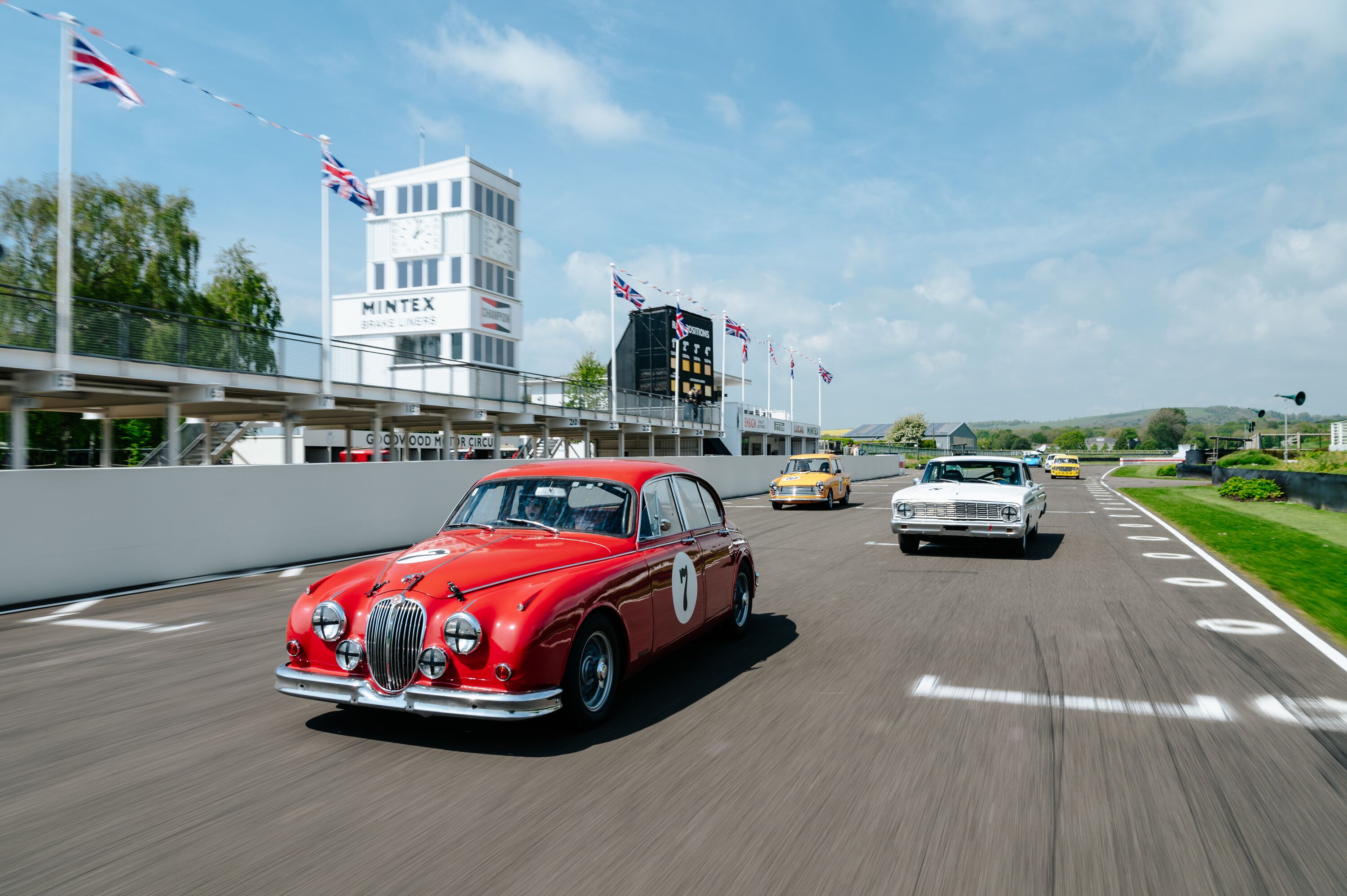The best cars at Retromobile 2022
Ordinarily in early February each year, various members of the GRR digital editorial team would be packing their bags and heading off to Paris for the greatest in-door classic car exhibition in the world; the greatly-anticipated annual Retromobile salon. Due to the Covid-19 pandemic, however, the 2021 Retromobile edition was understandably postponed. The revised 2022 event was delayed until late March and consigned to a small hall (Halle 7) in the enormous Porte du Versailles Paris exhibition centre. With some degree of normality restored, the March 2022 (46th) edition of this important show was smaller than usual. Smaller it might have been but the 2022 Retromobile certainly didn’t disappoint, displaying its now-customary eclectic mix of some of the finest international race and road machines from around the world.

Inevitably, it is usually the local French cars that garner star billing at Retromobile, with the delayed 2022 ‘light’ event being no exception, despite some outstanding displays of none-local cars, such as McLaren F1s, Lamborghinis and ‘Groupe A’ homologation road-going cars (Subaru Impreza, Nissan Sunny GTI-R, etc.).
To indulge in some of the 2022 highlights, in no particular order, here is a selection of just ten of the many fancies (mostly French) that caught our eye recently within the busy halls of the smaller but still fascinating 46th Retromobile;
Gordini Racing Tribute
Know locally in period as ‘le Sorcier’ (the Sorcerer), French racing car supremo Amedeo Gordini’s famous competition workshop was ultimately based just across the road from the Paris exhibition centre on Boulevard Victor in what is now the Porte du Versallies Mercure Hotel.
Born in Italy in 1899, blacksmith Gordini’s first love of boxing frequently took him to Paris in his twenties. Falling for the place, he finally chose to settle there as an apprentice mechanic at a small garage in Surenes, located opposite the main Talbot factory, near Paris. He later set up a Fiat agency and quickly built a fine reputation for tuning Fiat-derived Simca engines for racing, winning the 1933 Mont-Valerien hillclimb himself in a Fiat 514 (which became the Simca 6).
In 1936 Gordini signed an agreement with Simca-founder Henri Pigozzi to tune his cars and start winning races for the marque, which he achieved pre-war, winning the Simca 5’s class at Le Mans and setting 22 world endurance records at the banked Montlhery racetrack. Immediately post-war, Gordini-tuned ‘production’ and single-seater Simcas were back winning races, with Gordini possessing an added flair to sift out new and unknown racing talent, such as his Argentine discovery, Juan Manuel Fangio!
Once Simca withdraw its factory support in the early 1950s, astonishingly Gordini managed to keep winning races on a shoestring budget, before Renault commissioned (saved) him in 1957 to develop a performance derivative of its new Dauphine model, plus successfully create new V6 and V8 competition engines.
In a special homage display at the 2022 Retromobile, an impressive line-up Gordini race cars was presented, including a 1930s Simca 5 single-seater, the victorious Gordini Type 16, a gorgeous Type 15 S and 18 S, plus the huge Works Laffly team support truck.
McLaren F1
Arguably the star of the 2022 Retromobile for many, for the 35th anniversary since the launch of the ground-breaking McLaren F1, Geneva-based classic car broker Simon Kidston gathered together an impressive and sumptuous display of seven F1 models – both road-going and competition derivatives – including the 1995 Le Mans-winning car, plus George Harrison’s stunning aubergine-coloured road car, not seen out in public since 1997. Peter Stevens, the F1 designer, was on hand to talk through the subtleties of the car to an attentive and stunned Retromobile crowd.

Voisin T.E.P.
Retromobile consistently excels at presenting weird and wonderful (usually French) motorised transportation, and this year was no disappointment with a line-up of very rare, odd and unusual vehicles, such as this never-before-seen Voisin T.E.P. (Transport Estafette Parachutable), a four-wheel-drive, amphibious and parachutable military vehicle prototype, the very last vehicle creation of the great car and aviation engineer genius, Gabriel Voisin, which sadly never made production.

Bandini race car collection
An outstanding gathering of cars at the annual on-site Retromobile collectors car auction, typically staged by Paris-based Artcurial, included a stunning collection of half-a-dozen competition cars developed and built by gentleman racer Ilario Bandini, as once owned by Belgian driver and collector Baudouin Lampereur. The highlight of these tiny and scarce Bandinis was a 1955 Berlinetta with characteristically Zagato coachwork, flanked by a delightful 750 Sport Siluro and a pair of Bandini Formula Juniors.
Gendarmarie Nationale collection
For the first time, the French Gendarmerie Nationale used Retromobile to display some of its 80-strong eclectic collection of police enforcement vehicles.
With eleven vehicles on display, representing land, sea and air, the Gendarmerie display centred around a 1958 Aloutette 2 helicopter and a 1965 Matra-Bonnet Djet, the world’s first production mid-engined sports car, and also the very first performance sports car used by the French rapid response brigades in 1966. This desirable coupe paved the way for a long line of other high performance cars used by the Gendarmerie, including Alpine A110 and A310s, Citroen SMs and Renault Sport Megane RSs. A special Gendarme snowmobile used during the 1992 Albertville Winter Olympics was an unexpected but welcome sight too.
Renault 5 50th anniversary
Renault took the main central exhibition area of the Retromobile hall to celebrate the 50th anniversary of its perky, popular and pioneering Renault 5 (R5) hatchback. When it first hit the streets in 1972, the R5 helped to popularise the hatchback city car concept. A fun and versatile urban cruiser, it became one of the most iconic cars of the 1970s
All key versions of the R5 were on display, from a fabulous bright orange base 1972 launch model with matching tangerine pvc sticky seats, through to a snarling Turbo 1, via the Gordini/Alpine and Super 5 GT Turbo hot hatch derivatives and coach-built Heuliez Le Car Van conversion, with the New 5 EV concept also making its public debut, ahead of launch later his year.
Bristol 450 LM
The bizarre but wonderfully aerodynamically-efficient mid-1950s Bristol 450 Le Mans racer made a very rare appearance. Up to four were built on period, but all were destroyed on Bristol Cars orders after the tragic events of the 1955 23 Hours race, of which the 450 played no part. The unusual Bristol won its class – and the team prize – in both the 1954 and 1955 Le Mans events. In addition to its 254 Hours endurance race victories, the Bristol 450 also took a number of outright speed records for the 2-litre class during trials at the Montlhery circuit near Paris in 1953.

Zagato-bodied Alfa Romeos
A trio of lightweight Zagato-bodied Alfa Romeos formed part of the Artcurial auction, proving to be real eye-catchers. Consisting of an emblematic rounded SZ, TZ1 and one of just 50 SZ ‘coda tronca’ built, this row of three Alfas, displayed at a jaunty angle certainly attracted huge attention.

Castarede TM 001 3-wheeler
One of the more unusual contraptions at the 2022 Retromobile was the one-off homemade Castarede, an 800cc three-wheeler built in 1938 by garage owner Paul Castarede. Using an air-cooled Gnome et Rhone motorcycle engine and Amilcar front suspension, the TM 001 three-wheeler was built as a spare-time indulgence and used by Castarede throughout the War.

Villard Type 27
Sharing stand space with the Castarede in Retromobile’s ‘freaks corner’ was another pre-war three-wheeler, a 1927 Villard Type 27. Unlike the Castarede the Villard was actually productionised and offered for sale publically, with a number being sold. Using a tiny single-cylinder 350cc motor, Marcel Villard first introduced his rustic three-wheeler in 1924 (featuring one steered wheel at the front and two at the rear), offering a choice of coachwork, including a popular twin-seater pick-up derivative, as per the Retromobile example. Small-scale production continued until 1935.
Images courtesy of Gary Axon
Retromobile
Retromobile 2022





















